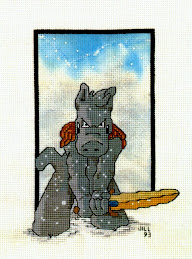 Home Improvement - Undead Edition
Home Improvement - Undead Edition, was one of those anthologies I mentioned in the review of
Westward Weird.
Like all anthologies
Home Improvement - Undead Edition has the usual collection of stories that sometimes hit the mark and other times fall well wide of it, depending on personal taste.
Charlaine Harris has leant her name to a number of these recently, trading on the success of her
Sookie Stackhouse series (filmed by
HBO as
True Blood), and the theme this time is home renovation. Although it sounds like it may be hard to get a good collection out of that premise they succeed by and large and seem to find it easier than some of the other premises that may initially sound to have more scope to work with. I'll cover the contents story by story.
The opener:
If I Had a Hammer by
Charlaine Harris, is centred around her
Sookie Stackhouse character. I haven't read the books, but I have seen the show, so I'm familiar enough with the characters. I found the story about a possessed house a little disappointing and very run of the mill. I may have reacted better to it if I were a fan of the
Sookie Stackhouse stories.
Victor Gischler, who wrote
Wizard Home Security, was not an author I know, but I believe he's done some work on the
X-Men comics. The story set in a fantasy world where even wizards need magical type security on their dwellings was different for this sort of collection, it had a couple of appealing characters and a nice twist at the end. He has plans to develop the concept into a book and I'll be keeping an eye out for it.
Patricia Briggs is one of the more successful urban fantasy authors in the field today.
Gray was my first encounter with her work, it read rather like
Cherie Priest's recent
Cheshire Red duology, although I thought
Priest did a better job. Not something that would encourage me to read more
Patricia Briggs.
I've seen a few less than enthusiastic responses to
Rochelle Krich's Squatters Rights, I won't be one of them. I loved this. For mine it was the best story in the book. A standalone fable about a possessed house that turns the occupants on each other, encouraging one to kill the other. It had echoes of
American Horror Story, and it was very well done. A suitably chilling end was very clever.
Having written over 150 books it's hard not to have heard of
Heather Graham (it's not the same person as the actress), and while I'd heard the name I hadn't ever read her before. I really didn't like
Blood on the Wall, it was fine when it was about a nerdy kid who discovered that claiming he could summon demons and gain a cult following was good for turning the tables on the bullies and getting girls to sleep with him, but once they introduced the alpha male vampire detective character the whole thing turned into a pretty predictable paranormal romance. I was barracking for the bad guys in this one.
The Mansion of Imperatives by
James Grady was also fairly predictable. There's only so many evil houses one can buy.
Melissa Marr used a little heard of branch of the fae for
The Strength Inside and I have to say I liked it and it's tale of dealing with councils and militant home owners organisations. Nicely twisted ending, too.
Woolsley's Kitchen Nightmare by
E.E Knight seemed set within the author's
Vampire Earth concept. It was a fast moving tale that seamlessly inserted the reader into the concept and was very tongue in cheek for most of it. I'd love to meet one of the six armed bartenders.
For me of course the highlight was
Through This House by you guessed it:
Seanan McGuire. This was set in
Seanan's Toby Daye series. It featured 3 of my favourites from the series; Toby's Fetch May, bridge troll and cab driver Danny and young Tuatha de Danaan noble Quentin. It also filled in a small blank between books. It was fun without being special. It's always nice to visit with Toby and friends.
The Path by
S.J Rozan moved a little slow for mine, it was different in that it examined an Asian setting, but other than that struggled to hold my attention.
Stacia Kane's Rick the Brave seemed to set within one of her series concepts and did not grab me at all. There's a depressing sameness about many urban fantasy and paranormal romance concepts and this one fell into that.
I've been meaning to look at
Suzanne McLeod's Spellcrackers.com series and
Full-Scale Demolition was set in that world, and is set before the series opener had enough to do in it to keep me entertained and has prompted me to give
Spellcrackers.com a try.
I've read a bit of
Simon R. Green before and
It's All in the Rendering which was a standalone was delightful. In some ways it was a little like
John De Chancie's Castle series. I don't think he's adapted it into a series, which is a shame, because I'd definitely read more about these characters and setting. You have to love a house set in two worlds, where Grendel and the Leanan Sidhe are house guests.
The other editor
Toni L.P Kelner finished the collection off with
In Brightest Day. It was a voodoo based tale, I don't know what it is about voodoo, but it just doesn't excite me. I had the same problem with
Laura Resnick's Unsympathetic Magic.






















